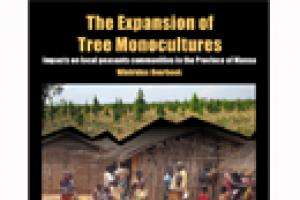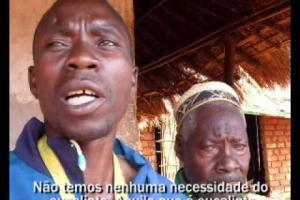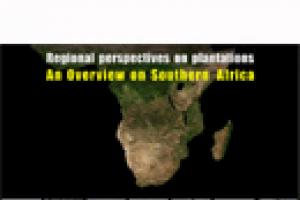For a number of years, peasant farmer communities in the province of Niassa, in northern Mozambique, have been fighting back against the expansion of monoculture pine and eucalyptus plantations. This expansion has caused serious problems because it is taking over land from machambas, small family farms used to grow food. Now the struggle waged by these communities has received a significant boost.
Mozambique
Other information
30 April 2011
Bulletin articles
30 December 2010
The FSC (Forest Stewardship Council)website has announced that the company Chikweti Forests of Niassa, which operates in the province of Niassa in northern Mozambique, is seeking the FSC “green label” for a 33,916-hectare monoculture tree plantation. According to the website, the pre-evaluation was carried out in November 2010, and the main evaluation is anticipated for February/March 2011. The FSC certification body in this case is Soil Association Woodmark, based in the United Kingdom.
Bulletin articles
30 May 2010
The government of Mozambique is in the process of expanding large-scale monocultures of alien, fast-growing tree species, mainly eucalyptus, pine and teak trees in the northern part of the country.
Publications
18 May 2010
A field report, by Winfridus Overbeek.
This publication is the result of a visit to Mozambique in November 2009 by two activists involved in the struggle against tree monocultures in the Brazilian state of Espírito Santo. This visit was made possible by the World Rainforest Movement (WRM) with the goal of exchanging experiences about large-scale tree monocultures.
Other information
30 January 2010
Pine and eucalyptus planting companies are advancing on land belonging to peasant family communities in several provinces in northern Mozambique. This is a relatively recent process, encouraged by the Mozambique Government that sees monoculture tree plantations as a tool to promote development and progress in the more remote regions such as the province of Niassa.
Multimedia
11 January 2010
Only available in Portuguese.
Other information
29 April 2009
Thirty-one families from the districts of Lichinga and Sanga in northern Mozambique have not been able to harvest any crops this 2008/2009 season due to their obligatory withdrawal from their crop areas (machambas) to other new areas because of a “reforestation” megaproject. The inhabitants are blaming the reforestation projects for the devastation of their machambas.
Publications
15 December 2008
Timber plantations in southern Africa are concentrated in South Africa, Zimbabwe and Swaziland, but they are also expanding in Mozambique. There are smaller areas in Angola, Zambia, Malawi and Tanzania. In South Africa, the largest areas are in the provinces of Mpumalanga, KwaZulu-Natal and the Eastern Cape, covering 1.5 million hectares of land. Additionally, an estimated 1.6 million hectares have been invaded by plantation species such as acacias (wattle), eucalyptus (gum) and pines.
Other information
28 August 2008
Mozambique is a country rich in forest resources, with a total forest area of approximately 40.6 million hectares and 14.7 million hectares of other wooded areas (DNTF, 2007). Most provinces have vast areas of unspoiled, beautiful forests, from where rural communities acquire several goods for subsistence as well as for cultural and spiritual reasons. Forest diversity is however poorly documented due to several reasons such as the vastness of the country, poor transport network, the long-lasting civil war, and the general lack of human and financial resources.
Bulletin articles
29 December 2006
In 1997 the Kyoto Protocol was formalized within the United Nations Convention on Climate Change to limit carbon emissions causing global warming. Although since then the situation has become more acute due to the accelerated impacts of climate change, during the Conferences talk mainly addresses the “opportunities” of this catastrophe, understood as business.
Other information
5 June 2006
In May 2006, the Mozambique Ministry of Agriculture submitted for discussion the document “National Reforestation Strategy” (the complete document in Portuguese can be found at http://www.wrm.org.uy/paises/Mozambique/Estrategia_Reflorestamento.doc). As stated in the document, the bases to promote the establishment of tree plantations in the country involving fast-growing species are set out.
Bulletin articles
14 July 2005
While accounts of illegal logging in southeast Asia’s and central Africa’s tropical forests, to supply the booming Chinese economy are increasingly common, this report is one of the first to document the “Chinese takeaway” from the semi-arid forests of Southern Africa. A four-months study of forestry in Zambezia province of Mozambique was conducted between November 2003 and October 2004.



